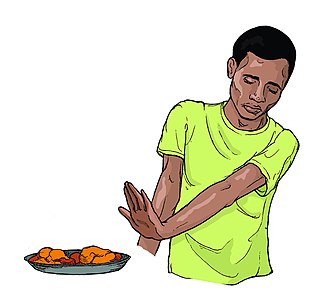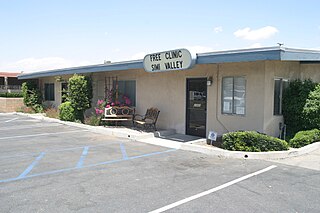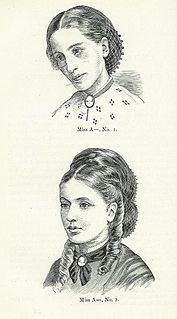
Anorexia is a medical term for a loss of appetite. While the term in non-scientific publications is often used interchangeably with anorexia nervosa, many possible causes exist for a loss of appetite, some of which may be harmless, while others indicate a serious clinical condition or pose a significant risk.
An eating disorder is a mental disorder defined by abnormal eating behaviors that negatively affect a person's physical or mental health. Only one eating disorder can be diagnosed at a given time. Types of eating disorders include binge eating disorder, where the patient eats a large amount in a short period of time; anorexia nervosa, where the person has an intense fear of gaining weight and restricts food or overexercises to manage this fear; bulimia nervosa, where individuals eat a large quantity (binging) then try to rid themselves of the food (purging); pica, where the patient eats non-food items; rumination syndrome, where the patient regurgitates undigested or minimally digested food; avoidant/restrictive food intake disorder (ARFID), where people have a reduced or selective food intake due to some psychological reasons ; and a group of other specified feeding or eating disorders. Anxiety disorders, depression and substance abuse are common among people with eating disorders. These disorders do not include obesity.

Health care or healthcare is the improvement of health via the prevention, diagnosis, treatment, amelioration, or cure of disease, illness, injury, and other physical and mental impairments in people. Health care is delivered by health professionals and allied health fields. Medicine, dentistry, pharmacy, midwifery, nursing, optometry, audiology, psychology, occupational therapy, physical therapy, athletic training, and other health professions are all part of health care. It includes work done in providing primary care, secondary care, and tertiary care, as well as in public health.
Promotion of anorexia is the promotion of behaviors related to the eating disorder anorexia nervosa. It is often referred to simply as pro-ana or ana. The lesser-used term pro-mia refers likewise to bulimia nervosa and is sometimes used interchangeably with pro-ana. Pro-ana groups differ widely in their stances. Most claim that they exist mainly as a non-judgmental environment for anorexics; a place to turn to, to discuss their illness, and to support those who choose to enter recovery. Others deny anorexia nervosa is a mental illness and claim instead that it is a lifestyle choice that should be respected by doctors and family.

The healthcare industry is an aggregation and integration of sectors within the economic system that provides goods and services to treat patients with curative, preventive, rehabilitative, and palliative care. It includes the generation and commercialization of goods and services lending themselves to maintaining and re-establishing health. The modern healthcare industry includes three essential branches which are services, products, and finance and may be divided into many sectors and categories and depends on the interdisciplinary teams of trained professionals and paraprofessionals to meet health needs of individuals and populations.
Health insurance or medical insurance is a type of insurance that covers the whole or a part of the risk of a person incurring medical expenses. As with other types of insurance, risk is shared among many individuals. By estimating the overall risk of health risk and health system expenses over the risk pool, an insurer can develop a routine finance structure, such as a monthly premium or payroll tax, to provide the money to pay for the health care benefits specified in the insurance agreement. The benefit is administered by a central organization, such as a government agency, private business, or not-for-profit entity.
The term managed care or managed healthcare is used in the United States to describe a group of activities intended to reduce the cost of providing health care and providing American health insurance while improving the quality of that care. It has become the predominant system of delivering and receiving American health care since its implementation in the early 1980s, and has been largely unaffected by the Affordable Care Act of 2010.
...intended to reduce unnecessary health care costs through a variety of mechanisms, including: economic incentives for physicians and patients to select less costly forms of care; programs for reviewing the medical necessity of specific services; increased beneficiary cost sharing; controls on inpatient admissions and lengths of stay; the establishment of cost-sharing incentives for outpatient surgery; selective contracting with health care providers; and the intensive management of high-cost health care cases. The programs may be provided in a variety of settings, such as Health Maintenance Organizations and Preferred Provider Organizations.

Beat is the UK's leading charity supporting those affected by eating disorders and campaigning on their behalf. Founded in 1989 as the Eating Disorders Association, it celebrated its 30th anniversary in 2019.

A free clinic or walk in clinic is a health care facility in the United States offering services to economically disadvantaged individuals for free or at a nominal cost. The need for such a clinic arises in societies where there is no universal healthcare, and therefore a social safety net has arisen in its place. Core staff members may hold full-time paid positions, however, most of the staff a patient will encounter are volunteers drawn from the local medical community.
Relative energy deficiency in sport (RED-S) is a syndrome in which disordered eating, amenorrhoea/oligomenorrhoea, and decreased bone mineral density are present. It is caused by eating too little food to support the amount of energy being expended by an athlete, often at the urging of a coach or other authority figure who believes that athletes are more likely to win competitions when they have an extremely lean body type. RED-S is a serious illness with lifelong health consequences and can potentially be fatal.
The Eating Disorders Coalition (EDC) is a Washington, D.C. advocacy organization working to advance the federal recognition of eating disorders as a public health priority. The EDC was founded in 2000 and is incorporated in Massachusetts. The full legal name of the organization is the Eating Disorders Coalition for Research, Policy & Action.

Lutheran Services in America is the national office of a network of 300 Lutheran health and human services organizations across the United States. Headquartered in Washington, DC, Lutheran Services in America amplifies the voice of its $23 billion network to aid community leaders and advance policies and practices that improve the lives of people and communities. It is recognized by the Chronicle of Philanthropy and Forbes as one of the nation’s top nonprofit organizations.

The National Eating Disorders Association (NEDA) is an American non-profit organization devoted to preventing eating disorders, providing treatment referrals, and increasing the education and understanding of eating disorders, weight, and body image. The National Eating Disorders Association organizes and sponsors National Eating Disorders Week. Also known as NEDAwareness Week, it takes place during the last week of February, and is "a collective effort of primarily volunteers, including eating disorder professionals, health care providers, students, educators, social workers, and individuals committed to raising awareness of the dangers surrounding eating disorders and the need for early intervention and treatment."

Lily Jane Collins is a British and American actress and model. Born in Guildford, Surrey and raised in Los Angeles, Collins began performing on screen at the age of two in the BBC sitcom Growing Pains. In the late 2000s, Collins began acting and modelling more regularly, and she had a career breakthrough with her performance in the sports-drama film The Blind Side, which was the third highest-grossing film of 2009. She went on to appear in leading roles across feature films such as the sci-fi action-horror Priest (2011), the psychological action-thriller Abduction (2011), the fantasy Mirror Mirror (2012), the urban fantasy The Mortal Instruments: City of Bones (2013), and the independent romantic comedies Stuck in Love (2012), The English Teacher (2013), and Love, Rosie (2014).

Anorexia nervosa, often referred to simply as anorexia, is an eating disorder characterized by low weight, food restriction, body image disturbance, fear of gaining weight, and an overpowering desire to be thin. Anorexia is a term of Greek origin: an- and orexis, translating literally to "a loss of appetite"; the adjective nervosa indicating the functional and non-organic nature of the disorder. Anorexia nervosa was coined by Gull in 1873 but, despite literal translation, the symptom of hunger is frequently present and the pathological control of this instinct is a source of satisfaction for the patients.
Health care in the United States is provided by many distinct organizations, made up of insurance companies, healthcare providers, hospital systems, and independent providers. Health care facilities are largely owned and operated by private sector businesses. 58% of community hospitals in the United States are non-profit, 21% are government-owned, and 21% are for-profit. According to the World Health Organization (WHO), the United States spent $9,403 on health care per capita, and 17.9% on health care as percentage of its GDP in 2014. Healthcare coverage is provided through a combination of private health insurance and public health coverage. The United States does not have a universal healthcare program, unlike most other developed countries.

To the Bone is a 2017 American drama film, written and directed by Marti Noxon. The film follows a young woman, portrayed by Lily Collins, as she battles anorexia. The film premiered in competition at the Sundance Film Festival on January 22, 2017, as a contender in the U.S. Dramatic Competition. It was released worldwide on Netflix on July 14, 2017. Netflix's release of the film was met with controversy, with some arguing that the film glamorises anorexia.
Oral manifestations of systematic disease are signs and symptoms of disease occurring elsewhere in the body detected in the oral cavity and oral secretions. High blood sugar can be detected by sampling saliva. Saliva sampling may be a non-invasive way to detect changes in the gut microbiome and changes in systemic disease. Another example is tertiary syphilis, where changes to teeth can occur. Syphilis infection can be associated with longitudinal furrows of the tongue.

Starving in Suburbia is a 2014 American psychological drama made-for-television film about a high school student and competitive dancer, Hannah, who develops a severe eating disorder after becoming obsessed with a pro-ana forum on Tumblr that promotes self-starvation, as Hannah's family are preoccupied by her wrestler brother's upcoming tournament. The film stars Laura Wiggins, Brendan Meyer, Paula Newsome, Marcus Giamatti, Izabella Miko, Emma Dumont and Callie Thorne. It received mixed reviews from critics, while being noted for addressing two phenomenons previously unaddressed by made-for-television films: pro-ana websites, and anorexia among males.











